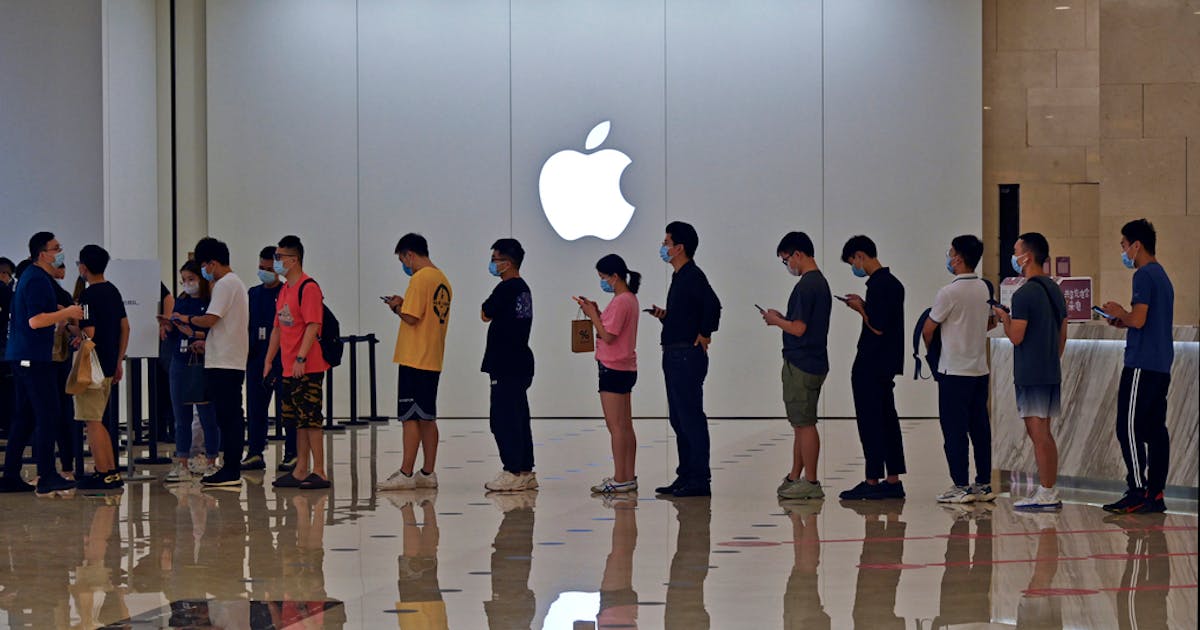Power cuts in China could foreshadow shortages of global goods
BEIJING – Buyers around the world face a possible shortage of smartphones and other goods before Christmas after blackouts to meet official energy consumption targets forced Chinese factories to close and left some households in black.
In northeastern Liaoyang City, 23 people were hospitalized with gas poisoning after the ventilation of a metal casting factory was cut due to a power outage, the channel said. CCTV public television station. No deaths have been reported.
Factories have been slowed down to avoid exceeding energy consumption limits imposed by Beijing to promote efficiency. Economists and an environmental group say manufacturers used up this year’s quota faster than expected as export demand rebounded after the coronavirus pandemic.
A supplier of components for Apple Inc.’s iPhones said it had suspended production at a factory west of Shanghai on orders from local authorities.
The disruption of China’s vast manufacturing industries during one of their busiest seasons reflects the ruling Communist Party’s struggle to balance economic growth with efforts to curb pollution and greenhouse gas emissions. .
“Beijing’s unprecedented determination to enforce energy consumption limits could lead to long-term benefits, but the short-term economic costs are substantial,†Nomura economists Ting Lu, Lisheng Wang and Jing Wang said on Monday. .
They said the impact could be so severe that they lowered their economic growth forecast for China to 4.7%, from 5.1% a year earlier in the current quarter. They reduced their annual growth outlook to 7.7% from 8.2%.
Global financial markets were already worried about the possible collapse of one of China’s biggest real estate developers, Evergrande Group, which is struggling to avoid default on billions of dollars in debt.
Manufacturers are already facing processor chip shortages, disruption in shipments and other lingering effects of the global halt in travel and trade to tackle the coronavirus pandemic.
Residents of northeast China, where fall temperatures are dropping, are reporting power cuts and have called on the government on social media to restore supplies.
The crisis comes as world leaders prepare to attend a United Nations environmental conference by video link on October 12 and 13 in the southwestern city of Kunming. This increases pressure on President Xi Jinping’s government, as the meeting host, to show that it is sticking to emissions and energy efficiency targets.
China is one of the world’s largest emitters of climate-modifying industrial gases and consumes more energy per unit of economic output than developed countries.
The ruling party is also gearing up for the Winter Olympics in the Chinese capital, Beijing, and neighboring Shijiazhuang in February, a time when it will want clear blue skies.
Dozens of companies have announced that electricity rationing could force them to delay order fulfillment and could hurt them financially.
Apple component supplier Eson Precision Engineering Co. Ltd. said on Sunday it would halt production at its Kunshan plant, west of Shanghai, until Thursday “in accordance with energy restriction policy of local government “.
Eson said the suspension is not expected to have a “significant impact” on operations.
Apple did not immediately respond to a question about the possible impact on iPhone supplies.
China’s energy use and industrial emissions have increased as manufacturers rush to meet foreign demand at a time when competitors elsewhere are still hampered by anti-coronavirus controls.
China’s economy is “more export-driven than at any time in the past decade,” but official energy consumption targets do not take this into account, economists Larry Hu and Xinyu Ji said. of the Macquarie Group in a report.
Some provinces used most of their energy consumption quotas in the first half of the year and are cutting back to stay below their limits, according to Li Shuo, climate policy expert at Greenpeace in Beijing.
Utilities, meanwhile, are being stifled by soaring coal and gas prices. This discourages them from increasing production as the government limits their ability to pass costs on to customers, Li said.
Prices have risen “beyond what the Chinese power industry can handle,” Li said.
China has launched repeated campaigns to make its energy-intensive economy more efficient and to clean up smog-suffocated cities.
City skies are noticeably clearer, but the abrupt manner in which campaigns are conducted is disrupting electricity, coal and gas supplies, leaving families shaking in unheated homes and forcing factories to close.
Malls in the northeastern city of Harbin have announced that they will close their stores earlier than usual to save energy.
In southern Guangdong Province, the government has asked the public to set air conditioner thermostats higher even if temperatures exceed 34 degrees C (93 degrees F).
State Grid Corp., the world’s largest electricity distributor, is committed to ensuring an adequate supply.
Meanwhile, state media claim that local governments have signed long-term coal contracts to secure adequate suppliers.
___
Soo reported from Singapore. AP writer Huizhong Wu in Taipei, Taiwan, contributed to this report.

